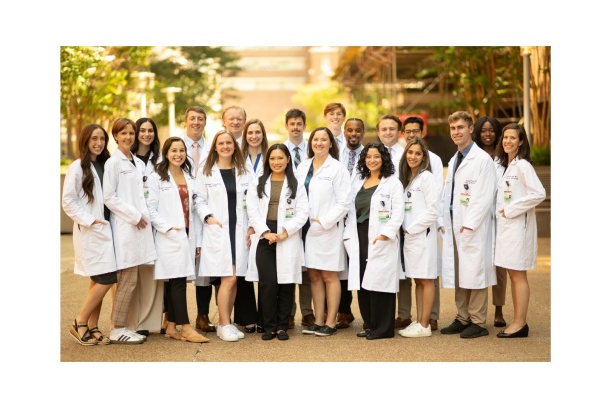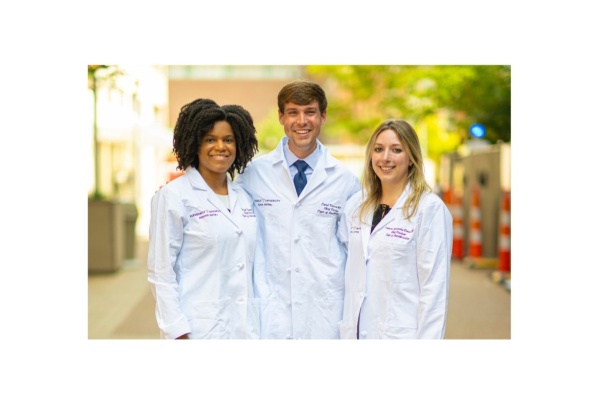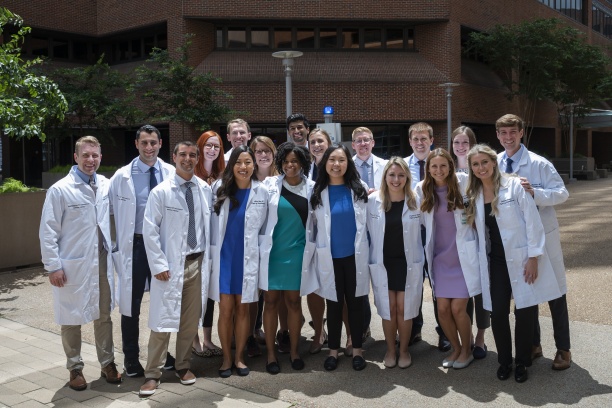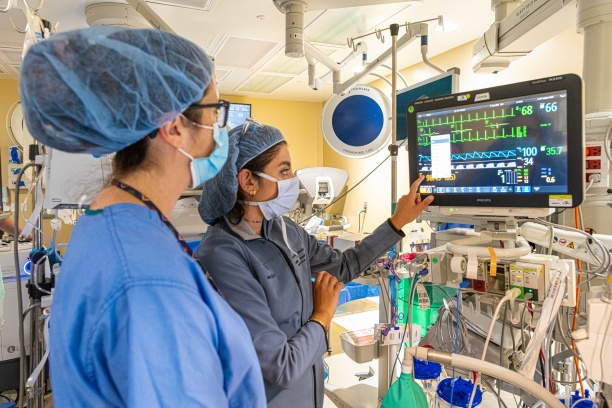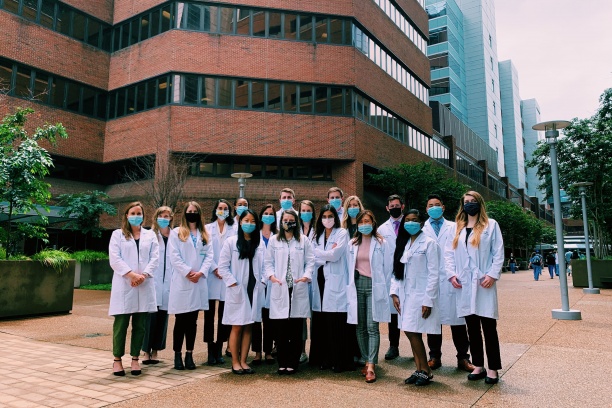The Vanderbilt Department of Anesthesiology Residency Program provides comprehensive education, training and clinical experience in all facets of anesthesiology and perioperative medicine. Anesthesiology residents study and train under the mentorship of a highly respected academic faculty comprising subspecialty-trained clinicians, committed and experienced physician-educators and successful physician-scientists. Extraordinary clinical and academic training enables graduates to secure competitive fellowships and to achieve success as clinicians, academicians and leaders of our profession.
-
To our 2025-2026 applicants:
Applicants need to apply utilizing the AAMC's Electronic Residency Application Service (ERAS). The Match is with the National Residency Matching Program (NRMP).
We offer 23 positions total/year, 22 positions in the Anesthesiology Categorical Track and 1 position in the BH Robbins Anesthesiology Research Track (see below). Our application requirements include CV, personal statement, MSPE (dean's letter), transcript, and a minimum of three letters of recommendation. A USMLE Step 1 or COMLEX 1 is required to apply, and either a USMLE Step 2 core or COMLEX 2 score is required prior to February 1, 2026. The application requirements are the same for international medical graduates. In addition, we do require a minimum of one year of US clinical experience for these applicants. We accept J-1 visas only, and do not support H1-B sponsorship.
BH Robbins Anesthesiology Research Track
The BH Robbins Scholars Anesthesiology Research Track offers 1 position designed exclusively for applicants seeking physician-scientist development in addition to Categorical Track training during residency. BH Robbins Scholars receive many benefits including personalized mentorship and career development with a senior mentor and research group based on the field of interest of the candidate, protected time for research during residency (6-months scheduled based on the need of the candidate, project, and mentor – typically during CA-2 and CA-3 years), participation in a monthly seminar and an annual research symposium, support for attending national meetings, research and educational support resources, and a stipend during residency. Scholars are encouraged to apply for the NIH Training in Perioperative Sciences (TIPS) T32 Training Grant at the end of residency.
This program is devoted to developing the careers of the next generation of physician-scientists in our field and provides extensive resources to facilitate career development of scholars during and following residency training.
Interested applicants should complete an application for the BH Robbins Scholars Program and apply to both the BH Robbins Anesthesiology Research Track (1702040C1) and the Anesthesiology Categorical Track (1702040C0), as accepted applicants will be interviewed by both research and clinical faculty and will be listed accordingly in the NRMP Match. In addition, the BH Robbins Scholars Program is not limited to candidates who match into the Research Track. Candidates who have submitted an application and match into the Categorical Track will also join the Program and receive full benefits. Get additional information about this program and application details.
The application deadline is September 24, 2025.
Selection Process
Upon receipt of your application, the Residency Selection Committee will review your credentials. Interviews are scheduled by invitation only. Interviews are conducted on select Monday and Friday mornings (Central Time) during October, November, and December. All interviews will be conducted virtually for the 2025-26 season. MSTP and research applicants should indicate their desire to participate in a research-specific interview date to meet with both clinical and research faculty in a tiered interview day.
If you have additional questions regarding the application process, please contact:
Lisa McIntosh, BS
Program Coordinator & Associate Program Manager
Educational Affairs
lisa.r.mcintosh@vumc.org
615-936-1830
-
As we again are entering a virtual interview season, we thought we would answer some of the questions most frequently asked of us. Many of these questions have come from our Virtual Open House sessions, and since there are more that would like to attend these than available spots, we thought this would serve as an easy way to share answers to these questions.
1) Are all of your interviews going to be held virtually this year?
Yes, as we are keeping in line with guidance from our professional organizations (ASA, SAAPM, ACGME) and our institutional GME guidelines. This applies to all applicants, including home and visiting students.2) Will you permit in-person visits or second looks?
Yes, we will offer a very limited number of second look opportunities to all interviewed applicants after our rank list has been certified. We have set aside Fridays in January for in person visits. Dates to be announced. Second look visits on dates other than what we have set aside for this purpose will not be permitted. Space will be limited, and these spots will be first come, first serve. Second look visits will have no bearing on an applicant's ranking, as our rank list will already be certified by this time. We encourage interviewed applicants to come only if it will be helpful for them personally. More information will be sent out to all applicants who interviewed with us at a later date. Airfare, hotel and any other travel expenses will be the applicant's responsibility.3) Now that USMLE Step 1 is being reported as pass/fail only, will you utilize Step 2 scores instead?
We review all applications in their entirety, that is, not pre-screening based on single test scores. Although this type of review takes considerable time and energy, applications are read and scored on multiple criteria, including but not limited to basic and clinical grades, research participation and production, volunteer and social missions and contributions, curiosity, cultural awareness, creativity, maturity, professionalism, etc. As such, time from application availability date (September 27 this year) to offer of interview may take several weeks as we do not simply “filter” through our applications.4) Do you offer more spots for interviews than available? No. If you are offered a spot to interview, you will have time (72 hours) to respond to that request before forfeiting your spot.
-
General Information
Clinical anesthesia training is conducted on the campus of Vanderbilt University Medical Center with key locations listed below. Additional training is also provided in satellite ambulatory surgery locations.
- Vanderbilt University Hospital
- Monroe Carell Jr. Children’s Hospital at Vanderbilt
- VA Medical Center (on VUMC campus)
PGY-1 (CA-0) Year
The Clinical Base Year provides a strong foundation in medicine, surgery, critical care and perioperative care, facilitating a smooth transition into anesthesiology training at the end of the year. Eighteen (18) categorical positions are available for the Clinical Base Year (CBY) of residency training. Interns rotate through the following services at Vanderbilt University Hospital, Monroe Carell Jr. Children’s Hospital at Vanderbilt, and the VA Medical Center:
- 2 months Internal Medicine
- 2 months Perioperative Medicine
- 2 months Critical Care (Surgical ICU, Medical ICU)
- 1 ½ Months Surgery
- 2 Weeks Blood Bank/Benign Heme Consult
- 1 month Emergency Medicine
- 1 month Neuroscience
- 1 month Pain Medicine
- 1 month Anesthesiology (June)
- 1 month Professional Development
CA-1 and CA-2 Years
Residents gain experience in the fundamentals of clinical anesthesiology and perioperative medicine during clinical assignments in the inpatient and outpatient surgical suites, as well as the obstetric suite, of Vanderbilt University Medical Center. Residents complete approximately 450 cases annually, satisfying nearly all ACGME case requirements for residency by the end of the CA-2 year.
Residents encounter a diverse patient population and a wide range of surgical cases of varying complexity. During their CA-1 and CA-2 years, residents develop competence in the following anesthesiology subspecialties:
- Perioperative Medicine, including High Risk Surgical Encounter Clinic (HI-RiSE Clinic)
- Anesthesia for General Surgery
- Anesthesia for Orthopedic Surgery
- Anesthesia for Urological Surgery
- Anesthesia for Gynecological Surgery
- Vascular and Thoracic Anesthesia
- Anesthesia for Plastic and Burn Surgery
- Anesthesia for Endocrine Surgery
- Anesthesia for ENT and Ophthalmologic Surgery
- Transplantation Anesthesia
- Obstetric Anesthesia
- Cardiothoracic Anesthesia
CA-3 Year
The Advanced Clinical Track allows residents to gain experience in advanced and complex anesthesia and perioperative medicine during assignments on the various clinical anesthesia, critical care, and perioperative services of the Department of Anesthesiology, including but not limited to Vanderbilt International Anesthesia, elective rotations, perioperative anesthesia management, and research (1 month). Participation in the BH Robbins Scholars Program enables residents to complete the Clinician Scientist Track during the CA-3 year.
-
Stipend Amounts (Click link to learn more.)
Vanderbilt provides individual and family benefits for all housestaff. These include medical and dental insurance; disability and life insurance; medical liability insurance; free covered parking; on-call meals; uniforms; and laundry services. Please see the detailed description of these benefits on the Graduate Medical Education website. (Click link to learn more.) Vanderbilt also has an on-site day care center and a housestaff lounge.
The Department of Anesthesiology provides additional benefits to support our residents and families including:
- Moving expenses (single and family)
- Generous education fund (prorated to year of training)
- iPad
- iPhone
- Dedicated Resident Library with computer workspace
- ACLS
- Internal moonlighting opportunities
Vacation
- All residents: three weeks per year
- 2 additional personal days per year
Educational Meetings
- CA-2 and CA-3: Allowed five educational meeting days annually to attend approved anesthesiology CME program.
-
The Vanderbilt Department of Anesthesiology’s commitment to global health is historically strong, with demonstrated participation and leadership in international teaching/medical service opportunities by our faculty and staff over the last several decades. The department also offers two significant educational opportunities: a one-month, ACGME-approved rotation for Vanderbilt residents in their CA-3 year, and a global health fellowship that includes the opportunity to also earn a master of public health degree as part of the fellowship. Listed below are our most significant global health endeavors.
Learn more about Vanderbilt International Anesthesia Program.
